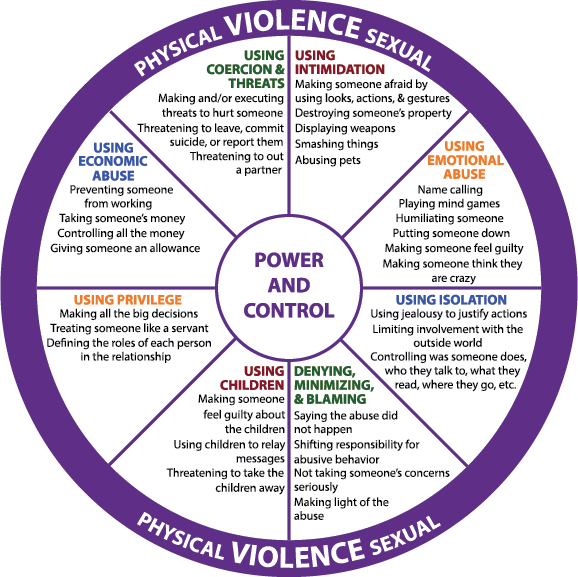
How Do You Know if it’s Domestic Abuse?
Domestic violence, or intimate partner violence, is the willful intimidation, physical assault, battery, sexual assault, and/or other abusive behavior as part of a systematic pattern of power and control perpetrated by one intimate partner against another.
Domestic violence is not just physical.
This epidemic takes on many forms including physical abuse and stalking, verbal/emotional and psychological abuse, sexual abuse, reproductive coercion, financial abuse, digital and social abuse, cultural and spiritual abuse, as well as pets and property. The frequency and severity of domestic violence can vary dramatically; however, the one constant component of domestic violence is one partner’s consistent efforts to maintain power and control over the other.
Get Help

Help. Education. Hope.
At Southern Valley Alliance, our highly trained expert advocates are available 24/7 to talk confidentially with anyone in Minnesota’s Carver and Scott Counties who is experiencing domestic violence, seeking resources or information or questioning unhealthy aspects of their relationship.
The Hotline provides lifesaving tools and immediate support to empower victims and survivors to find safety and live free of abuse. We also provide support to friends and family members who are concerned about a loved one.
Resources and help can be found by calling (952) 873-4214.
Our 24-hour Crisis Line provides a safe place to call, vent, cry and clarify answers to questions whether you are a victim or a concerned family member or friend. Our advocates are always available and all calls are free and confidential.
If you’re worried about calling you can also email our crisis address.
Our Programs and Services
Order for Protection in Minnesota
SVA advocates for and empowers victim-survivors in Scott and Carver counties in Minnesota through what can be an overwhelming and confusing process, especially in light of the stress and trauma surrounding domestic violence.
Transitional Housing
Through partnerships with the Carver County Community Development Agency (CDA) and private property managers, SVA manages several scattered site transitional housing units throughout Scott and Carver Counties.
Call the SVA 24/7 Crisis Line at 952-873-4214, option 1 for more information.
For Family and Friends
If you’re family or a friend of someone you think is being abused, we have resources and steps you can take to get them the help they need.
Safety Planning
Put a plan in place ahead of time to keep yourself, your children, and your pets safe.
Court Advocacy
SVA partners with law enforcement, attorneys, and other agencies to advocate for and empower survivors through what can be an overwhelming and confusing process, especially in light of the stress and trauma of domestic violence.
Local Resources and Services
There are several resources and services in Minnesota’s Scott and Carver Counties available to you.
STAY SAFE

Stay Safe When Getting Help
It’s critical for your safety to reach out when your partner is not around. If your partner does come home or walk in while you’re talking with an advocate, immediately disconnect the call. Because abusive relationships are based on power and control, an abusive partner is likely to react in anger as you take steps to regain control.
Create Your Personalized Safety Plan
Digital safety tips
Read our tech and social media safety tips for ways to “check your tech” and ensure your safety on the computer or phone.
Remember to delete our number from your phone and clear your internet browser history after visiting our website.
One in Three Teens Will Experience Dating Violence
What is Dating Violence?
Dating violence is any controlling, abusive, and aggressive behavior in a dating relationship, romantic relationship, or intimate partner relationship. It can include verbal, emotional, psychological, physical, sexual, digital, social, financial, cultural, or spiritual abuse, as well as pets and property. No form is worse than another, and many forms are often used in combination with one-another.
Abusive behaviors often begin between the ages of 12-18, which is why it is important to have conversations about healthy relationships and the warning signs of abuse at a young age. By educating pre-teens, teens, and young adults on the relationship spectrum, setting boundaries, consent, identifying red flags, and encouraging them to speak with trusted adults, we can help prevent abusive relationships.
Warning Signs
Because relationships exist on a spectrum, it can be hard to tell when a behavior crosses the line from healthy to unhealthy or even abusive. Use these warning signs of abuse to see if your relationship is going in the wrong direction:
*CONTENT WARNING* The content and topics shared in this video may affect individuals differently based on lived experiences.
According to the National Domestic Violence Hotline, 1 in 3 adolescents have experienced some form of relationship abuse.
One of our goals at Southern Valley Alliance is to educate teens and young adults about the characteristics of unhealthy and abusive relationships and empower them to talk to a trusted adult if they are questioning aspects of their relationship or need help. By promoting awareness, sharing warning signs, and encouraging individuals to create healthy personal boundaries, we take a step towards preventing and stopping the cycle of abuse.
Checking your cell phone or email without permission
Constantly putting you down
Extreme jealousy or insecurity
Explosive temper
Isolating you from family or friends
Making false accusations
Mood swings
Physically hurting you in any way
Possessiveness
Telling you what to do
Pressuring or forcing you to have sex
Name calling, insults or threats
Gaslighting
Stalking
There is help available
If you think you may be in an unhealthy relationship call Southern Valley Alliance’s 24-hour Confidential Crisis Line at 952-873-4214 to talk to a trained advocate.



